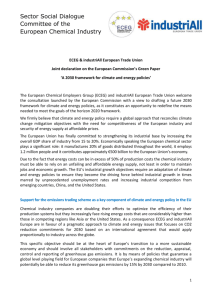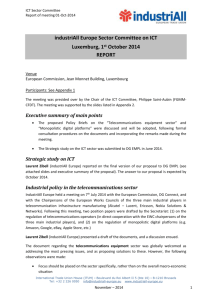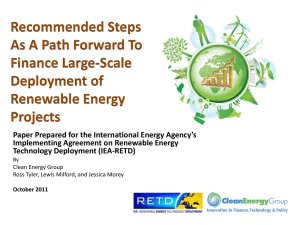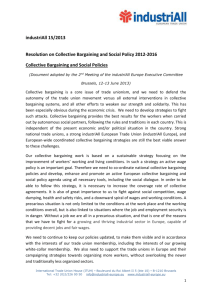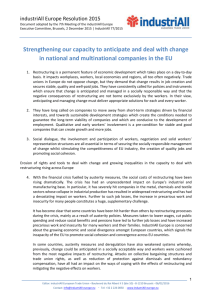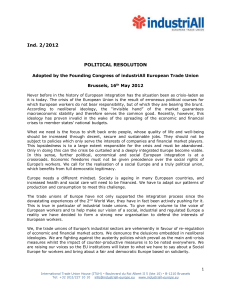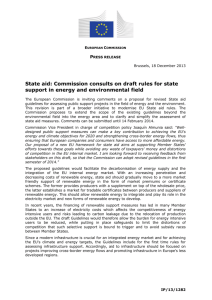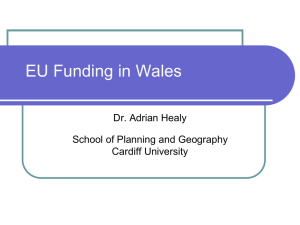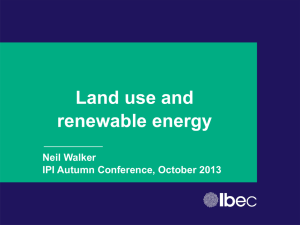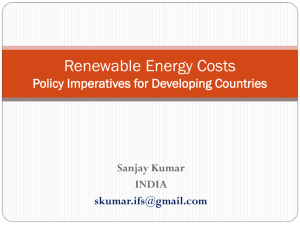Discussion Paper: Towards a European Energy Policy
advertisement
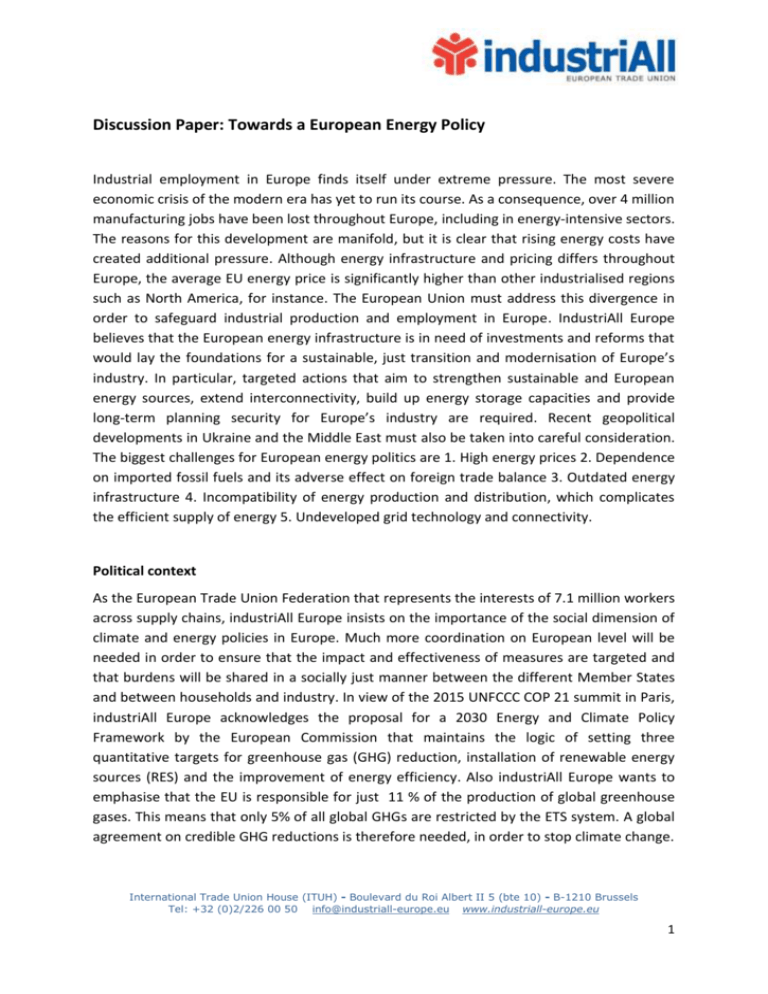
Discussion Paper: Towards a European Energy Policy Industrial employment in Europe finds itself under extreme pressure. The most severe economic crisis of the modern era has yet to run its course. As a consequence, over 4 million manufacturing jobs have been lost throughout Europe, including in energy-intensive sectors. The reasons for this development are manifold, but it is clear that rising energy costs have created additional pressure. Although energy infrastructure and pricing differs throughout Europe, the average EU energy price is significantly higher than other industrialised regions such as North America, for instance. The European Union must address this divergence in order to safeguard industrial production and employment in Europe. IndustriAll Europe believes that the European energy infrastructure is in need of investments and reforms that would lay the foundations for a sustainable, just transition and modernisation of Europe’s industry. In particular, targeted actions that aim to strengthen sustainable and European energy sources, extend interconnectivity, build up energy storage capacities and provide long-term planning security for Europe’s industry are required. Recent geopolitical developments in Ukraine and the Middle East must also be taken into careful consideration. The biggest challenges for European energy politics are 1. High energy prices 2. Dependence on imported fossil fuels and its adverse effect on foreign trade balance 3. Outdated energy infrastructure 4. Incompatibility of energy production and distribution, which complicates the efficient supply of energy 5. Undeveloped grid technology and connectivity. Political context As the European Trade Union Federation that represents the interests of 7.1 million workers across supply chains, industriAll Europe insists on the importance of the social dimension of climate and energy policies in Europe. Much more coordination on European level will be needed in order to ensure that the impact and effectiveness of measures are targeted and that burdens will be shared in a socially just manner between the different Member States and between households and industry. In view of the 2015 UNFCCC COP 21 summit in Paris, industriAll Europe acknowledges the proposal for a 2030 Energy and Climate Policy Framework by the European Commission that maintains the logic of setting three quantitative targets for greenhouse gas (GHG) reduction, installation of renewable energy sources (RES) and the improvement of energy efficiency. Also industriAll Europe wants to emphasise that the EU is responsible for just 11 % of the production of global greenhouse gases. This means that only 5% of all global GHGs are restricted by the ETS system. A global agreement on credible GHG reductions is therefore needed, in order to stop climate change. International Trade Union House (ITUH) - Boulevard du Roi Albert II 5 (bte 10) - B-1210 Brussels Tel: +32 (0)2/226 00 50 info@industriall-europe.eu www.industriall-europe.eu 1 In the context of the 2030 energy framework proposal and with the objectives of both driving down emissions and safeguarding - as well as creating - jobs, industriAll Europe supports: - - A general objective of reducing greenhouse gas emissions by at least 40 % when compared with 1990; A European objective of at least 30% of renewables in the final energy mix, combined with binding national objectives taking into consideration the geographical, economic and social characteristics of the Member States; An objective of reducing primary energy consumption by at least 30% when compared with 2005, combined with binding objectives for the Member States. The adoption by the European Union of a regulatory framework for 2030 is a necessary condition for the conclusion of an international agreement in Paris in 2015, but it is also an economic, social and political necessity for a Europe which is highly dependent on imported energy (mainly fossil fuels) and needs to strengthen domestic production. The United Nations conference in Paris has to produce a global agreement that is sufficiently ambitious in terms of reducing GHG emissions to keep global warming below the tipping point of two degrees Celsius. Without a global regulatory framework that creates a global level playing field, efforts undertaken by frontrunners on climate policy are bound to clash with the imperatives of competitiveness inherent in the current economic system. A 2030 climate and energy policy framework has to be holistic and must link the objectives of mitigation of climate change with the need for competitiveness, security of energy supply in Europe and the need to reduce the EU’s dependence on energy imports. Only a reliable policy framework for 2030 can ensure and promote investments in Europe. Overall European targets should be translated into binding national targets, including sectoral and interim (2025) sub-targets and assessments with a regard to the capacity and energy infrastructure of each Member State. Targets should not, however, be one-sided and need to be realistic compared to other economies. To achieve this, the EU will have to establish trade policies with third countries that link trade relations with the compliance targets set out in the 2030 framework. A Trade Union Approach The need for a European energy policy is a direct consequence of the current crisis of the European economic model which is based on steadily increasing consumption. Any discussion on energy policy needs to consider a fundamental change to this model and that bringing about an economic transformation means decreased consumption of raw materials and energy. Reduced consumption, longer product life-cycle and recycling are essential International Trade Union House (ITUH) - Boulevard du Roi Albert II 5 (bte 10) - B-1210 Brussels Tel: +32 (0)2/226 00 50 info@industriall-europe.eu www.industriall-europe.eu 2 components in advancing this concept and creating a better and more sustainable European economy. For industriAll Europe, a comprehensive energy policy is key and needs to be based on longterm objectives that are both technologically and economically feasible and on a regulatory framework able to deliver on climate change commitments, affordable energy services and security of supply. Significant investments to maintain the existing energy production infrastructure as well as to build up a smart grid infrastructure and domestic RES are required in order to ensure the supply of affordable energy for Europe’s industry and for private households. At the same time, it will remain necessary to invest in bridge technologies whilst also anticipating changing demands for skills throughout all sectors on the labour market. The involvement of Social Partners in the decision-making process is crucial. Energy and industrial policy are linked and should complement each other in order to ensure a socially-just transition towards an eco-efficient modernisation of industrial production throughout Europe. With energy costs far outweighing labour costs in some sectors (i.e. energy accounts for roughly 40% of the production cost in the glass sector), EU energy policy must enable the European Union to meet its climate obligations and to decouple economic growth from energy consumption, whilst addressing the issue of rising energy costs. Repercussions on the general consumers’ budget should be limited. Universal access to essential energy services needs to be ensured for all people living in Europe, notably through the provision of adequate social tariffs and through public investment. Within an EU framework, every single EU Member State should have an opportunity to implement its own energy policy and energy mix, which takes into account their national energy demand, industrial structure and energy intensity of production, location, natural circumstances and natural resources. Consideration should also be given to support for enterprises directly impacted by high energy prices. Energy intensive sectors are particularly exposed to high energy costs as the prices are fixed internationally and cannot be passed on to the end users. As a result, producers in third countries with lower electricity prices currently enjoy a competitive advantage over the European Union. This multi-faceted situation raises serious risks of relocation or carbon leakage leading to ever-growing imports from countries and regions that are not bound to the same level of energy and climate mitigation legislation, not to speak of the respect of labour rights. As a consequence, Europe must push for ensuring its energy independence and diversify its energy supply with a focus on domestic solutions, through strategic planning, RES, high savings, energy efficiency and smart and diversified technologies. The challenge for energy policy is therefore manifold: Firstly, to maintain competitiveness of the European economy, especially for energy-intensive industries and safeguard employment. Secondly, to ensure Europe’s position at the cutting edge of energy International Trade Union House (ITUH) - Boulevard du Roi Albert II 5 (bte 10) - B-1210 Brussels Tel: +32 (0)2/226 00 50 info@industriall-europe.eu www.industriall-europe.eu 3 technologies and, finally, to deliver on European climate objectives and a globally binding agreement. Competiveness and Security of supply The development and roll-out of RES will create new growth markets and lead to new, highquality jobs in many industrial sectors (as a result of the higher labour intensity of renewable or energy efficiency activities), but the setting of RES targets must take into consideration the different geographical circumstances and the most cost-efficient renewable energy production. Therefore, the inter-linkage of networks and the achievement of an internal energy market are crucial. IndustriAll Europe is convinced that raising energy productivity (input of energy per unit of production) will contribute to the sustainability and competitiveness of industry, deliver first-mover advantages to the European industry and create new jobs in the area of energy services. It is clear that competitiveness is not being achieved without a highly qualified and skilled workforce. The modernisation of the energy system, the enhanced integration of renewable energies, as well as the development of new energy efficient technologies in our industries must be accompanied by investment and improvement in training and education of our workforce, adequate remuneration and stable working conditions for all workers. The Commission outlined in its Communication (COM 2012 582; 10 October 2012) its intention to reverse the declining role of industry in Europe from its current level of around 16% of GDP to as much as 20% by 2020. IndustriAll Europe supports the safeguarding and development of the European industry as it ensures employment in industrial sectors in all Member States and regions of the European Union. A EU framework on climate and energy policies should recognise the EU’s commitment to retain and strengthen its industrial base whilst promoting efficiency and modernisation, supporting research, innovation and the development of new technologies and avoiding carbon leakage. The affordability of energy is a crucial factor for the competitiveness of energy-intensive industries. It would be incoherent to impose constraints on industry whilst at the same time relying on imported products that do not meet the same constraints. A long-term strategy of common European standards and support of energy technology is necessary, including the harmonisation of laws and standards supporting the realisation of the single market for energy and energy technology. A reliable network infrastructure must be put in place in order to ensure the security of supply. This implies the modernisation and the expansion of networks supported by faster permit granting procedures, the ongoing and uniform development Europe-wide smart grid technology and the modernisation and replacement of outdated and inefficient power plants, giving a strong impetus to sustainable energy generation. More attention needs to International Trade Union House (ITUH) - Boulevard du Roi Albert II 5 (bte 10) - B-1210 Brussels Tel: +32 (0)2/226 00 50 info@industriall-europe.eu www.industriall-europe.eu 4 be paid to energy efficiency, as it is the cheapest and most effective way to reduce GHGs, develop the European energy sector, create high quality jobs and increase competitiveness. Sectors that are not covered under the ETS system need to be more involved in efforts aimed at improving Europe’s overall performance on energy efficiency. The Way Forward Manufacturing, and in particular high value-added activities, need to be upheld and reinforced throughout Europe. New technologies have the potential to fuel innovation in a wide range of existing industrial structures. Creating a favourable economic environment for research and innovation is indispensible to that aim. This includes a comprehensive and coordinated legislative environment that allows for investment certainty and for increased investment in research and innovation. Increased public support and public-private partnerships are also crucial to promote research and innovation. Many established sectors have already shown a high capacity to innovate (e.g. steel, non-ferrous metals, chemicals, cars, shipbuilding, etc.) and/or have comparative advantages which should be fully exploited. It would therefore be wrong to concentrate policies purely on new, high-tech activities. Policies aimed at the permanent reinforcement of innovation potential and their link with key industries must also be implemented at the same time. This is a process of gradual transition towards an innovative new industrial paradigm based on the existing industrial structures in Europe. Setting the right incentives is crucial in this context. Emission pricing has not yet provided sufficient encouragement for deployment of low-carbon technologies; some Member States are scaling back support schemes for renewable energies and access to finance in the present context of economic crisis has become more difficult. Progress in energy efficiency is lagging behind. Energy efficiency is the most cost-effective way to reduce emissions, therefore industriAll Europe demands a strong political commitment from the national governments and the EU to transform Europe into the number one continent of energy efficiency and in order to ensure confidence, credibility and predictability once more. IndustriAll Europe regards the ETS framework as a tool to achieve the EU emission reduction targets and to industrial recovery and modernisation. Emission trading needs to be reformed in a way that ensures that allocation of free allowances is strictly related to efficiency, productivity and technological progress that results in reduced emissions per unit of output. The system should not allow for windfall profits. Instead, revenues collected through the auctioning of ETS certificates need to be recycled into RID for the industrial sectors covered under the scheme in order to facilitate technological development. The NER300 programme is an encouraging project that needs to be extended. International Trade Union House (ITUH) - Boulevard du Roi Albert II 5 (bte 10) - B-1210 Brussels Tel: +32 (0)2/226 00 50 info@industriall-europe.eu www.industriall-europe.eu 5 Eventually, ETS could also be developed into an instrument applied worldwide and provide for fair international competition. It must nonetheless be pointed out that the system currently in place has shortcomings that need to be addressed in order to ensure credibility and predictability for all actors involved. Any proposals made regarding climate targets for 2030 must not only be guided by efforts to ensure the long-term functionality of ETS and the prospect of delivering a desirable carbon price, improved through the control and regulation of competent institutions, but also need to evaluate carefully immediate impacts on employment on a European labour market already in crisis. As a measure of last resort, border adjustment measures or a tax on the carbon content of imported goods should be considered. IndustriAll Europe supports a consistent expansion of renewable energies with the objective of a gradual and sustainable shift in this direction until they become the leading technology for a future energy system. Several kinds of RES need to be considered, such as biomass, biofuels, wood, solar, wave and wind energy, black liquor, wastes, peat etc. At the same time, smart choices need to be made in this economic transformation process, with a focus on ensuring that new additional investments in the energy sector are made in sustainable units rather than closing down units which have not reached the end of their life-cycle. Being aware of the current limitations and in view of the medium- or long-term integration of RES into the system, it is necessary to advance the technology for capturing and storing CO2 (CCS) so as to allow for the environmental sustainability of the energy carrier (conventional energy sources) which should ensure the supply and the balance of the power system in Europe. At the same time, in order to realize increased shares of renewable energies in the energy mix, current obstacles have to be tackled. A modernised energy infrastructure is therefore necessary, i.e. modernised and expanded energy transmission networks and energy storage facilities in order to integrate renewable energies in the energy system, as well as taking into consideration the regulatory aspects of integrating renewable power into the grids and the provision of backing up capacities to balance the energy supply in view of a volatile renewable energy generation. IndustriAll Europe will carefully monitor how EU and national climate and energy policy performs with regard to job creation and advancing new technologies throughout the whole industry. Finally, we need an ambitious agenda for supporting research and innovation in Europe. Effective research and innovation policies are crucial for the development of, and investment in, energy efficient technologies, renewable energies as well as smart grids and storage facilities able to balance energy fluctuations from renewable energy sources. Europe’s industry requires an independent, efficient and affordable energy policy in order modernise and fulfill its role as the backbone and driver of the EU economy. Therefore, a European energy community should be considered. Investments in the qualification of International Trade Union House (ITUH) - Boulevard du Roi Albert II 5 (bte 10) - B-1210 Brussels Tel: +32 (0)2/226 00 50 info@industriall-europe.eu www.industriall-europe.eu 6 workers and anticipation of skills needs are paramount in this context. Without a highlyqualified workforce that can deliver results on energy and raw material efficiency, and climate change mitigation, whilst continuing to develop and produce high-quality products, any European attempt to transform its economy is bound to fail. Climate and energy policy should bring about a just economic transition that establishes a balance between competitiveness, mitigation of global warming and the creation of quality employment! International Trade Union House (ITUH) - Boulevard du Roi Albert II 5 (bte 10) - B-1210 Brussels Tel: +32 (0)2/226 00 50 info@industriall-europe.eu www.industriall-europe.eu 7
